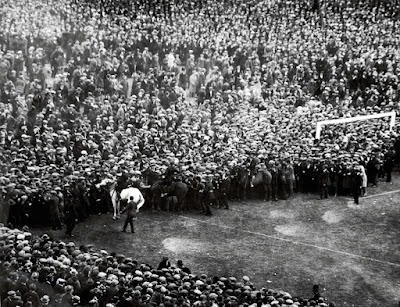Joe Webster - Goalkeeper & WWI Veteran | @RichEvansWriter
We take another look in our 'Footballers at War' series, at Joe Webster, a lower league goalkeeper who also served in the First World War. @RichEvansWriter tells the story:
 |
| (Image) |
Joe Webster, goalkeeper for both Watford and West Ham United, enlisted in the Football Battalion of the Middlesex Regiment during the First World War. Despite being deployed in sections of the line where enormous casualties were suffered, Webster survived hostilities, and served as a trainer for both Watford and Northampton Town.
He died in 1927 following an operation on a burst appendix in a Northampton hospital. Incomplete parish records mean that his actual date of birth within the year 1885 cannot be confirmed, so his given age at time of death fluctuates between 41 and 42.
Born in Ilkeston, Derbyshire, Webster joined Watford in 1910 at age 25 and, prior to 1914, made 131 appearances for the club. He was contracted to West Ham United from 1914 to 1919, but owing to the conflict, made only 19 appearances. Virtually all of his playing was in the Southern League; when the Football League was founded in 1888, its initial roster consisted entirely of clubs from the Midlands and the north of England. Football associations in the south of the country were firmly opposed to salaried players and it was not until 1891 that Woolwich Arsenal bucked the trend and turned professional.
 |
| Webster played for Watford before WWI, although their first badge did not appear till the 1920s. |
By the turn of the twentieth century, though, the Southern League was firmly established as the Football League’s largest rival and consisted of a mix of professional and amateur outfits. Its popularity grew, and it benefitted from several players defecting to it in protest at what they saw as punitive measures implemented by its rival.
By 1910, however, the hatchet had been buried; a reciprocal agreement between the two organisations had been reached, and the Charity Shield was competed for by the winners of the two respective leagues. Watford were stalwarts of the Southern League until after Webster had departed and West Ham only left it in 1919 when they gained admittance to the Football League’s Second Division.
In the military, Private Webster served in some of the war’s most notable locales between 1916 and 1918. While not all of his war records remain intact, he is known to have served on the Somme where the battalion took part in fighting at Waterlot Farm, and in Melville Wood in July 1916. He also served in the trenches at Serre and was involved in the attack at Redan Ridge later that autumn. Webster was present at Vimy Ridge in April 1917 too.
 |
| Waterlot Farm, the Somme - Where Webster is known to have fought. |
In addition, the goalkeeper-turned-soldier fought in the Third Ypres (also known as the Battle of Passchendaele). The action, lasting from July to November of 1917 was made all the more horrific when unseasonably wet weather combined with heavy shelling to turn the ground into a quagmire of liquid mud. Though German High Command later admitted that the campaign had caused unsustainable losses for its army, Lloyd George described it as follows: ‘It [Passchendaele] was indeed one of the greatest disasters of the war ... No soldier of any intelligence now defends this senseless campaign ...’ The suffering Webster must have witnessed would have been indescribable.
If ex-servicemen did not return home bearing physical injuries from the conflict, then they invariably carried mental scars. Frequently, they found the transition back to civilian life challenging. This would likely have been the case for Webster, but he would probably also have been dogged by the suspicion that what might potentially have been some of his best years performing between the sticks had been lost. They were instead spent struggling for survival in sandbag strewn shell-holes buried behind barbed wire in France and Belgium.
Already in his mid-30s by the end of the War, he may well have rued missed chances and, while facing competition from other, younger goalkeepers emerging from the ranks, wondered how much the War had derailed his career. After all, his move to West Ham United in 1914 had definitely represented a ‘step up.’ While league membership for the club was a few years away, this might have been expedited in the absence of hostilities; they were certainly not a club without potential – by 1923 they had been promoted to the First Division. Though they lost the ’White Horse Final’ to Bolton Wanderers in the same year, they remained a top flight team for the next decade. One wonders whether, in a parallel universe, Webster might have had a part to play in such footballing adventures.
 |
| The famous 'White Horse (FA Cup) Final' in 1923. |
When thinking about footballers in Wartime, it is necessary not to afford the sport they played too much importance; ultimately, it is a relatively paltry consideration when weighed alongside the human cost. The idea that a player’s career might have been truncated is of little significance when compared to all those combatants who lost their lives or returned home permanently injured. That aside, though, it does seem fair to suggest that for Joe Webster - the footballer - the First World War arrived at exactly the wrong moment; it likely robbed him of sporting chances with which he would never be presented again.
By Rich Evans, written for @TFHB.
(All pictures borrowed and not owned in any form by TFHB)




Comments
fantasy cricket app